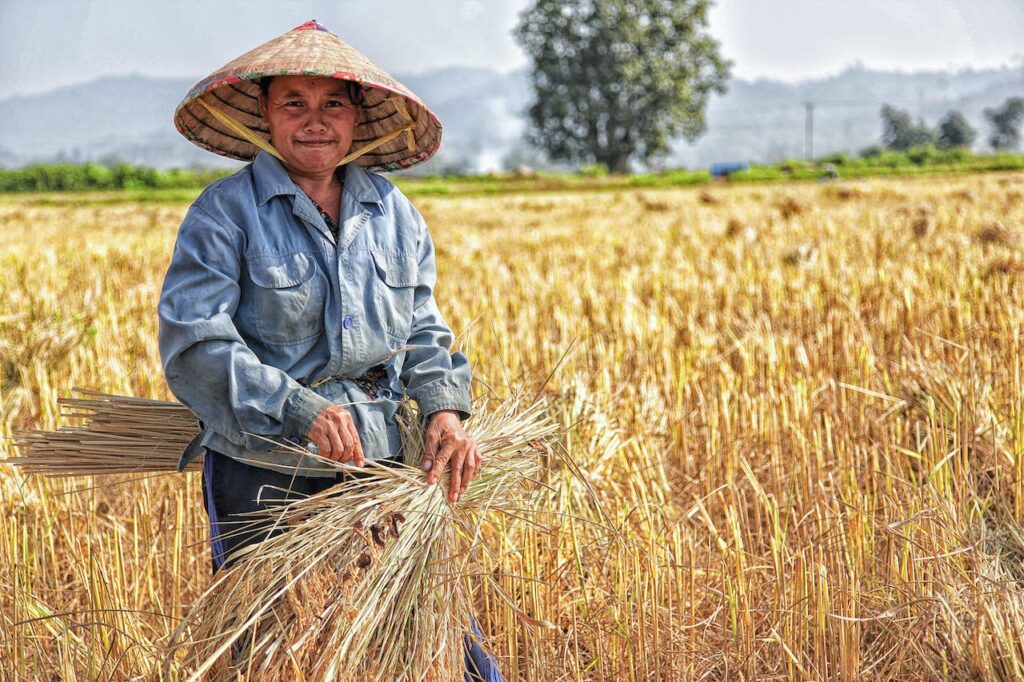This page may contain affiliate links, which means I may receive a commission from purchases made through links.
I learned how to grow a pineapple plant from a TikTok video. A creator on that platform teaches people how to grow food from the produce people already have in their homes. I came across his work, and I was fascinated. He made it look so simple, and I followed his instructions to the letter. But before I could harvest anything, I ran into a problem.
Anyone who starts growing plants knows it can be a frustrating process to learn. One important lesson the creator left out of his video is that timing matters. See, pineapple is a tropical fruit, and being that Florida has a tropical climate, it would normally be a great place to grow it. Except that I started in the fall of 2022.
That same winter, there was an abnormally low freeze period for just a few days, at one point reaching a low of 18 degrees Fahrenheit in Tallahassee. Being in direct sunlight didn’t make a difference; my pineapple plant didn’t make it through the cold. It wilted and never recovered, along with all the ferns in my yard. Despite my patience and hope that it would bounce back, it spent a few weeks rotting away in a pot on my porch.
Farmers throughout history have known this struggle. Different plants grow better at different points in the year, and many of them require care and attention all year long. Most farmers work, seven days a week, year-round, to make sure their crops are not ravaged by pests, withered by drought, or destroyed by enemies. Some crops can take years to produce anything, and after all that time and commitment, when a farmer finally sees the fruit of his labor, he still has work to do.
Harvesting crops is, at the same time, the most exciting and the most dreadful part of farming. It is back-breaking work to cut, pick, carry, bundle, organize, store, and preserve the food you grew, and it must be done quickly and efficiently to prevent food from spoiling on its way to be sold or eaten.
The Work of God
In John chapter 4, Jesus uses this idea of harvest as a defining lesson for his disciples. He speaks with a Samaritan woman at Sychar, promising her “living water” and telling her of a time when people would worship “in spirit and truth.” This conversation came to a close when she dismissively said that the Christ who is to come will clarify everything. And Jesus said, “I who speak to you am he” (John 4:26).
His disciples came back from town to find him alone with this woman, and unsurprisingly, they were surprised. Men being alone with women was considered imprudent in their culture. The text says, “They marveled that he was talking with a woman” (John 4:27), but no one voiced their concerns. Instead, they watched as the woman went into town saying, “Come, see a man who told me all that I ever did. Can this be the Christ?” (John 4:29). And the townspeople came out to see what she was going on about.
Now we know Jesus was tired and thirsty from earlier in this passage, and he was likely quite hungry too, as the disciples had gone into town to get food (verse 8). When they got back, the text says, “The disciples were urging him, saying, ‘Rabbi, eat.’ But he said to them, ‘I have food to eat that you do not know about.’ So the disciples said to one another, ‘Has anyone brought him something to eat?'” (John 4:31-33).
Hearing their murmuring, he responded, “My food is to do the will of him who sent me and to accomplish his work” (verse 34). This statement has stumped me for years. As an evangelical, I am accustomed to hearing illustrations and metaphors, some powerful and some cheesy. Typically, the cheesy ones come from people who like to sound too spiritual for “worldly” things. I am thinking of the teenage girl who claims to not want a boyfriend because she is “dating Jesus.” So cringey.
This is the vibe I get from Jesus with this statement. He is exhausted and hungry, and his disciples are just offering him food. It isn’t like when the devil was tempting him to break his 40-day fast in the wilderness. He is a man who has needs, and he needs to eat food, and when we stop at this statement, it just seems like Jesus is virtue signaling.
So thank God he did not stop there! Jesus has an important point to make to his disciples. He saw the confused expressions on their faces and explained what he meant: “Do you not say, ‘There are yet four months, then comes the harvest’? Look, I tell you, lift up your eyes, and see that the fields are white for harvest” (John 4:35).
Jesus is not necessarily refusing to eat food. He is trying to make a point to the disciples. When Jesus stopped at the well, they would have already been alerted by the fact that they had gone through Samaria instead of around it, as was the common path Jews took. They normally avoided Samaria like the plague. They knew something was up. They knew Jesus had a reason to be there, but their appetites got in their way. They missed out on a powerful conversation between Jesus and the woman who came to draw water. They missed his explanation of eternal life and living water. They missed the kindness and compassion he offered to her. And why? Because they wanted to eat.
Jesus wanted to get his disciples back on mission. They were focused on the wrong food, so he used their shared experience of hunger to show them what was happening before them in Samaria. He said that the fields were ready to be harvested.
The One Who Reaps the Harvest
At that very moment, the woman he had spoken to was on her way to preach to her entire village. He continued, “Already the one who reaps is receiving wages and gathering fruit for eternal life, so that sower and reaper may rejoice together. For here the saying holds true, ‘One sows and another reaps.’ I sent you to reap that for which you did not labor. Others have labored, and you have entered into their labor” (John 4:36-38).
“The one who reaps” is quite an unspecific identifier, and it has a manifold meaning. It first and foremost refers to Jesus himself, who is doing “the work of him who sent me.” But it also refers to the woman who was preaching as he said it. Finally, it is an admonition for the disciples who were caught out of focus; he reminds them it is their work too, saying, “You have entered into their labor.”
In the Pentecostal world, we love to send out missionaries, and missionaries love this passage. As they raise funds for their coming term, they will remind congregations that “the fields are white for harvest.”
Sometimes, they really are, but Jesus’ statement is not a universal truth for all times and places. In that moment, the fields of Samaria were white for harvest. On another occasion, as Jesus was preparing to send out his twelve apostles to the people of Israel, he said in Matthew 9:37 that “the harvest is plentiful.”
This was the case in the time of Jesus’ ministry and the early days of Christianity, but the fields are not always ready to be harvested. Jesus calls kingdom work “plowing” in Luke 9:62. Some places are hard, barren soil that needs to be plowed and loosened up before it can be given seed.
Jesus also says that “the kingdom of God is as if a man should scatter seed on the ground” (Mark 4:26). We know from other explanations of his that “seed” refers to the word, the message of God. So we see in the words of Christ a complete picture of the process to grow crops.
Get to Work, or Don’t
Speaking directly of Samaria as “the field,” he acknowledges that it had been previously sowed. The message of God had been planted, watered, and cared for by prophets and teachers of the past. We can tell because this woman revealed her own expectation of the coming Christ in verse 25. Even though Samaritans did not worship according to the law of Moses and the revelation of the prophets, they still had hope for the promise of their inheritance in their father Abraham.
Jesus said that the field of Samaria has produced eternal life for many. This reality comes full circle before the disciples over their next few days. We read in John 4:39-42, “Many Samaritans from that town believed in him because of the woman’s testimony, ‘He told me all that I ever did.’ So when the Samaritans came to him, they asked him to stay with them, and he stayed there two days. And many more believed because of his word. They said to the woman, ‘It is no longer because of what you said that we believe, for we have heard for ourselves, and we know that this is indeed the Savior of the world.'”
Today’s agricultural system is blessed with much machinery to assist in the process, but long before the industrial age, Jesus pointed many times to this process as an illustration of God’s work in the world. At that time in history, it was much more difficult, and that is how God chooses to demonstrate his work.
God’s people join into the work of the kingdom in any of those many ways as they are needed. The apostles got to experience great harvest as they initiated the kingdom of God throughout their known world, but once the initial harvest was complete, the work began anew. They would preach, people would repent and receive eternal life in Christ, and then there was more work to do. Those who had recently repented had to learn themselves how to grow and bear fruit in their own fields.
Doing God’s work means we enter into it wherever it is in the process. The apostle Paul addressed the Corinthian church, showing them that the work of the kingdom is not meant for one person to bear when he said, “I planted, Apollos watered, but God gave the growth” (1 Corinthians 3:6).
Some of us may come to an empty field, and we will know that it is time to put our hand to the plow to soften the soil and prepare it for the word of God. Some of us may do the planting. Others still will water and protect the new life we see coming from that seed. And still others will be able to see and reap the harvest, as people repent and give their lives to Jesus. We must be ready all the time to jump into whichever work is required of us, because it is likely that throughout our lives following Jesus, we will encounter every stage.
Sometimes the “field” can be a community, as we see with Samaria, and sometimes it is an individual. There are people in my life who care very little for the things of God because of their experience with his people. They are hardened to the gospel, barren soil. I can see this and understand that preaching to them is not going to do much if the seed doesn’t even pierce the surface of the soil. So, through relationship with them, I am working to till the ground and soften them to receive it. That is hard work that doesn’t reveal much progress.
Others have received the word already, and they require us to have the patience to not work so much as to disturb the growth. They need the presence and protection of the workers, but they do not need the seed plowed or harvested. It just needs time to grow.
Thinking in these terms requires wisdom, and sometimes we will find ourselves chastised by Christ when we lose sight of the mission like his disciples did. We need to pray for the Lord to open our eyes to those around us and help us understand the kind of work that needs to be done.
With Christ, we ought to look with great anticipation on the harvest to come in the future. Jesus said that doing God’s work was his food. He was sustained and moved by this excitement, this anticipation, this expectation of eternal life for so many souls, that he was not distracted by even his own needs from the work before him.
Can you say the same?
Footnotes
*If you enjoyed this post, please comment your thoughts down below and consider subscribing to receive updates on new blog posts.



